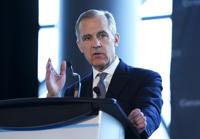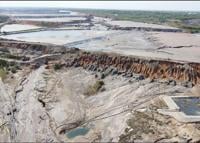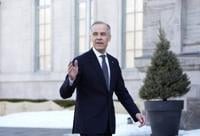There will be no further carbon price carve-outs, including for natural gas, Prime Minister Justin Trudeau said Tuesday, as criticism of his decision to temporarily exempt home heating oil from the policy mounts and his cabinet tries to quiet accusations of regional political favouritism.
Because heating oil is far more expensive than natural gas and a greater proportion of people who use it have no other option, the government is temporarily exempting it from the carbon price, Trudeau said.
This would give home heating-oil users time and money to replace their furnaces with electric heat pumps.
"There will absolutely not be any other carve-outs or suspensions of the price on pollution," he said.
In addition to exempting heating oil, the Liberals are doubling the top-up to the carbon price rebate for rural ºÚÁϳԹÏÍøs and expanding a grant program that for some lower-income ºÚÁϳԹÏÍøs will cover the full cost of installing heat pumps.
Trudeau made the promise suddenly last week after months of resisting vocal calls from his Atlantic caucus to provide cost-of-living relief, and as affordability is contributing to the Liberals' plummeting poll numbers.
But with the policy exemption limited to just home heating oil — which is most common in Atlantic Canada — premiers in the Prairies and Ontario immediately cried foul.
And Conservative Leader Pierre Poilievre crowed that the Liberals were cowering as his "axe the tax" campaign yields results.
Alberta Premier Danielle Smith demanded immediately that the carve-out be extended to natural gas, which is used to heat four in five homes in her province.
Ontario Premier Doug Ford said the carbon price should be scrapped altogether, and Manitoba Finance Minister Adrien Sala said Tuesday that Manitobans deserve fairness, and that he would be speaking to the federal Liberals about what can be done to help his province.
Saskatchewan Premier Scott Moe said he was going to direct SaskEnergy to stop collecting the carbon price on natural gas altogether. That could come with legal penalties under federal carbon-price legislation.
Amid the criticism, NDP Leader Jagmeet Singh called Trudeau's plan a divisive approach, noting his party advocates instead to lift the GST off all home heating sources, recognizing it as an essential good that should not be taxed.
Even Mark Carney, the former Bank of Canada governor long rumoured to be a possible future Liberal leadership candidate, said Tuesday at a climate conference in Ottawa that he didn't agree with the carve-out.
"Many ºÚÁϳԹÏÍøs are struggling. They're struggling not because of the carbon tax, which gets rebated. They're struggling because of broad increases in energy prices and food prices, the impact on wages, ... the lingering effects of COVID as well," Carney said during a question-and-answer session after delivering remarks at the Net-Zero Leadership Summit.
"I would have looked for other ways to provide that support than the route chosen, not least because what is important is that clarity in terms of the overall plan, the overall direction. Because that certainty helps to incentivize change, so you can provide support here, but keep this certainty there."
The federal carbon price was first applied in 2019, requiring all provinces and territories to either have their own equivalent price on pollution or use Ottawa's.
It is growing each year, with the notion being that a slow increase in the cost of fossil fuels is an incentive for ºÚÁϳԹÏÍøs to find ways to use less of them, therefore lowering greenhouse-gas pollution.
A rebate is issued to households every three months, up from once a year, to offset the increased cost. The intent is for families to see that they are not worse off as a result of the carbon price, but still have an incentive to save even more money by cutting back their fossil-fuel use.
Trudeau has fought the last two elections over carbon pricing, and the announcement that heating oil would get an exemption is the Liberals' first retreat from one of their signature policies.
It has now become a signature policy of Poilievre to "axe the tax." He has not said what he would replace it with to cut Canada's emissions in line with international targets to slow global warming.
Accusations of regional favouritism for political purposes intensified on Sunday after Rural Development Minister Gudie Hutchings implied on CTV's Question Period that Prairie provinces should elect more Liberals if they want their voices heard on the need for carbon pricing relief.
When asked if he agrees with Hutchings, Housing Minister Sean Fraser, who represents a riding in Nova Scotia, said the heating oil decision is not about politics at all.
"When you look at the rural rebate, when you look at the exemption and when you look at the heat pump program, every province is eligible for those things," he said.
The heat pump installation grant was offered to every province, but each one had to sign a partnership to contribute to the grant. Only Newfoundland and Labrador, Prince Edward Island and Nova Scotia have done that so far. Natural Resources Minister Jonathan Wilkinson is currently in discussions about it with British Columbia and New Brunswick.
Fraser said that not every policy is going to affect every region the same way, but he also noted that home heating oil is used outside of Atlantic Canada, too. While heating oil is more common in Atlantic provinces as a proportion of the total, he said that looking at raw numbers, more households in Quebec and Ontario use it.
The Comprehensive Energy Use Database compiled by Natural Resources Canada shows that nationally 7.3 per cent of households — or 1.17 million homes — use heating oil for all or some of their heating needs.
About one in three homes in the Atlantic use it — or 286,000 households. In Ontario, fewer than one in 20 homes use heating oil, but because of Ontario's size, that still amounts to nearly 267,000 homes. In Quebec, almost one in eight homes, or 465,000 households, use it.
In Western Canada, 117,000 homes partly or fully rely on heating oil.
Finance Minister Chrystia Freeland said the carbon price exemption simply makes sense.
"Home heating oil is a very polluting form of heating oil," she said.
"Home heating oil also is really expensive, and home heating oil tends to be used by low-income and rural people. And when you take those three characteristics together, it makes a lot of sense to do what the prime minister announced last week."
Catherine McKenna, the former Liberal environment minister who helped implement the carbon price, called for Canada to "hold the course if we want to meet our targets."
This report by ºÚÁϳԹÏÍø was first published Oct. 31, 2023.










































